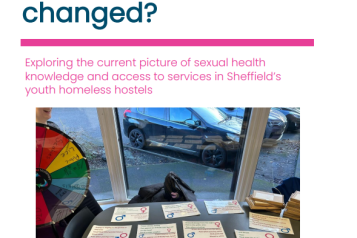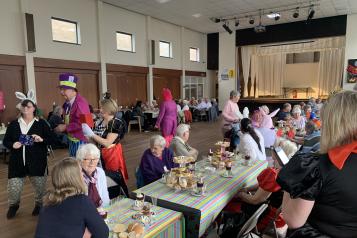Asperger's Children and Carers Together - supporting families of children with autism

ACCT is a parent and carer-led support group for autistic children and young people and their families in Sheffield. They run social and activity groups for a variety of age groups, as well as regular peer support meetings for parent-carers.
Their support group is parent-led, so they decide what they want to discuss and what is important to them.
What did parent-carers want to talk about?

Most of the parents in the group had already been through the process of assessment and diagnosis with their children, so they chose to focus on challenges that had arisen later. This includes getting support for their children in school, getting an Education, Health and Care Plan (EHCP) in place, and the importance of timely information-sharing and peer support.
What were the key findings?
- Information about diagnosis and about relevant services and support is very important but not always easy to get
- Peer Support provides a vital route to accessing information and support, often filling gaps left by formal services
- Navigating the system and getting the right support can be very hard – often feeling like a battle
- School is a challenging environment for many children and young people, and support provided is often not appropriate for their needs
- Applying for an EHCP is difficult – external support (peer support, independent consultants) can make a real difference
- Long waiting lists (for diagnosis and support) are having a big impact on families
- Some Health and Care Professionals show good understanding of how to work with autistic children, but others do not appear to have the knowledge needed to do this well
- Support for parent-carers – there are many challenges involved in caring, and sometimes this isn’t recognised as a responsibility over and above their parenting role. Some parents report feeling judged and not listened to by professionals
Interacting with health services
We asked parents to describe a positive experience they'd had with a health service - most of them revolved around caring and understanding staff:
"Local dentist - always explains what she is doing and asks child if they are ok with what she is doing"
We also asked about negative experiences - people shared more examples of this, and they largely focused on long waiting lists, staff who didn't understand the child's needs, and the difficulty of navigating between different services:
"Three years waiting list for CAHMS… aged out… NOW on waiting list with Sheffield Adult Mental Health for past 2.9 years… and counting. This service said there is no end in sight for when my son will be seen by them"
"We told [the nurse] he is autistic. She was dismissive and attempted to take blood without adapting her approach and ignored his obvious panic"
Parents also told us they felt their parenting was being judged, and they felt exhausted from having to fight for the right support. These were both major barriers to getting help for their families:
"They criticised my parenting throughout and suggested that the problem was my own mental health needs and not my son's"
"You have to fight for any help you get"
What next?

ACCT found that parents had faced a number of challenges getting the right support in place for their children. They also found that peer support had been extremely valuable for the parents in their group - sharing information and advice with people who have already been through various processes helped newer parents to assert their own rights. Many had also benefited from seeking independent, external support.
However, not everyone has access to this level of support - most will be reliant on formal, statutory services to meet their needs. The parents we heard from described the barriers to accessing these services, and these barriers are likely to be even greater for some people as a result of race, ethnicity, or socio-economic background.
We have made several recommendations to those who design, pay for, and deliver services. We would like to see them take into account the additional barriers that some people face and improve the equal access to information and support.
Find out more
To read about people's experiences in more detail, as well as the recommendations we've made for improvement, read the full report:


